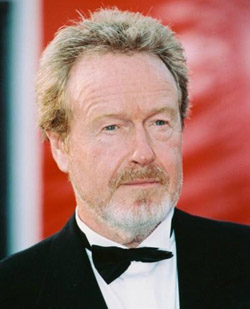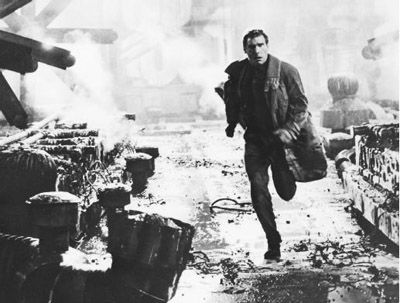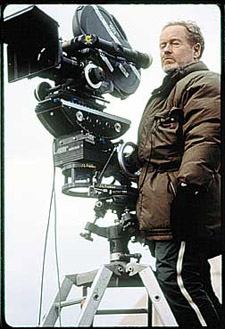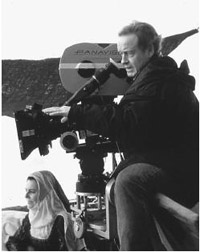 I’m
I’m
tempted to just cut the questions out of this roundtable with Ridley Scott. At
times he’ll just go off on his own and answer his own question. You’ll notice
that several times here, not that it makes the answers any less valuable.
In
fact, it’s amazing to listen to Scott
talk about his film. If you’ve ever discussed work you did so long ago that it
feels like the creation of someone else, you’ll find similarities here. While
he offers a lot of historical context, sometimes it sounds as if Scott is
talking about a film made by someone else. Fascinating stuff.
And
there’s something he says here that really knocked me back a bit: I’ve always been drawn to that collapse and possibility
of collapse. Which, when you think about it that way, is a perfect
encapsulation of Scott’s consistent conceit and thematic interest.
Those
who have read Paul Sammon’s Future Noir:
The Making Of Blade Runner will find not only a lot of redundant
recollection here, but some inconsistent info as well. If you haven’t read the
book, it’s essential, but there’s a lot to be said for getting the perspective
of the man himself.
So
here it is: a roundtable (unfortunately) with Ridley Scott on the occasion of Blade
Runner‘s 25th anniversary.
So after all of the
versions of the film, what went into naming this The Final Cut?
Exhaustion? I think that with it 25 years on, when they asked
almost a year and a half ago if I wanted to do this, I said yes. I hadn’t seen
it for a long time, about 12 years. It’s one of those films that was so special
to me that I didn’t want to revisit it, just in case I hated it. Or just in
case I had second thoughts. So it just sat on the shelf with me looking at it,
thinking, ‘nah’.
They said there is a base for doing this, and I asked to see a
print. They dug one up at Warners and ran it in a big theatre, and I turned up
with a notepad to make notes as to how we were going to fix it, and actually
there was nothing on the pad at the end of the screening. I was really happy. I
was actually elated, surprised. I thought I’d get rid of the voice over once
and for all, and if you get rid of that then you don’t want the ending…this is
a film noir. It’s an Elmore Leonard kind of influence, or Philip Marlowe. It’s
that kind of story, which of course is Mr. Dick and Mr. Fancher. Do Androids
has about 70 stories in the first 25 pages, so there was a big distillation
right down to the bottom line as to what this was about. That was the agony and
ecstasy of working with Hampton and Michael Deeley in the beginning, getting
this down to a screenplay that we could make. Have I answered the question? Or
have I meandered?
Would you call this
the director’s cut, or would you leave the previous release as the director’s
cut?
I’d say this is it. At the time, as you know, there was a lot of
disappointment, I’d call it too many cooks. What I’ve learned in movies is
there are frequently too many cooks. Part of the job they call director, one of
the hardest things to do is get a director that has a combination of being
assertive, sure, and has a vision. They’re very had things to get into place. And
I was pretty set when I did Blade Runner. I’d done two thousand
commercials [this might be exaggeration], 9000 awards at Venice and who knows
what bloody else [definitely exaggeration] and Duellists and Alien.
So I thought I was pretty well qualified. But there was a lot of…help. So I
think I did get cross while making it, and perhaps get a reputation for being
bad tempered, which I’m really not at all. And out of it came, which we can now
see, remarkably, a film that still stands on it’s own after 35 years. And it
gets better as it gets older.
It’s like a novella. It functions on a level almost like a book,
and I think there’s something to that. There’s not a lot of action, fighting.
But there’s a lot of interplay between really great characters. And the
characters are what keep it alive. And the unusual blow by blow organic
engagement of one character to the next scene. Everything makes sense. It all
ties itself up. And if you want to read at the end of the film, the idea of
parallels to where we are today, the parallels are there. Roy Batty is talking
about Apartheid, really. I don’t want to say that, but it’s all there if you
want to get that. There it is.
What went into the
process of shooting additional footage?
They’re more corrective things that at the time we couldn’t do
because we couldn’t afford it or the technology wouldn’t allow us to do it.
Today we can do it in a heartbeat. Anyone and their mother can do anything they
want. So we were able to do a lot of corrective things. There was also a lot of
stuff, going through outtakes and scenes
that were in and then thrown out, so a lot of that is interesting stuff,
because there was a time in the film industry when they tried to keep the magic
of filmmaking away from the audience. Now, everyone knows anything, how to
change a lens and load the camera and how special effects work. So you may as
well join the club. So the fifth disc gives you everything.
Are you impressed
with the archival material that still exists?
No, they tend to do that. Studios, thank god, tend to keep
things somewhere, even though I think they only recently got conscious of it.
There was a screening of Blade Runner in…at the Santa
Monica Film Festival…and what happened was someone asked for a copy of the
film, someone else took it from a drawer or off the shelf at Warners, and when
they ran it was a 65mm that we must have been quite comfortable with at the
time. When it began, there were no titles on it. It started out with a little
bit of Vangelis music, then it went to some Jerry Goldsmith, a little bit of
this, little bit of that, pretty damn good score. The temp score was brilliant.
At the end of it, people were flabbergasted, thinking ‘that’s not the film I
remember.’ That’s what really created this interest, and also showed the studio
that there’s an enduring interest in the film.

As you progress as
a filmmaker, is it frustrating to have a 25-year old work get more attention
than something like American Gangster?
No, it’s interesting actually. It’s flattering. And now as these
things can be really protected and kept. And what they’ve just found is that
digital doesn’t hold up as well as fotokem, so digital is already fading fast.
Did you know that? It’s going downhill — after ten years, voom! We took a
print, fotokem, celluloid, out of the lab, printed it, graded it, and it’s like
it was shot last week. Which means that you can’t rely on digital and what
studios are now doing is most films are finished with what is called an
old-fashioned Technicolor matrix, where there are three matrices, fundamental
colors, and once you’ve got that info you’ve got everything and can rebuild it
in two seconds. So that old method is the best.
What do you think
about the idea as an artist that once a project is completed and given to an
audience, it’s not yours anymore?
I don’t agree. I think you can do what you want. I’m like a
painter, and so I’ll finish a painting, but large size. And I’ll leave it,
think it’s finished. And put it aside, then one morning I’ll go back and look
at it, and think, um, I’m not sure now. Or, ‘it’s done’. My point is, you’ll
always go back and retouch the painting. The hard part is knowing when to stop.
 So with Blade Runner did you always feel that it
So with Blade Runner did you always feel that it
wasn’t quite finished?
When I make movies I tend to create the universe — I’m good at
that — and the universe means the world. And so that’s why people who like,
say, Gladiator,
have literally created a universe around it…people were sniggering about it,
like I was going to create this sword and sandal epic with Romans and silly breastplates
and shit, but now it’s created this huge spate of material with everything up
to Rome on television. So what that
means is you are fascinated by engaging in the universe. I think it’s very
important for an audience to be pulled into that universe. That’s the
difference between the best films and lesser ones.
(There was a
question here, but after listening several times to the rambling, multi-part
thing, I still have no idea what it was.)
Not really, because I’d traveled a lot at that point, and had
done a lot in Hong Kong, Tunisia, New York. Places that were most impressive
were Hong Kong, when I was there before the skyscrapers, it was 4000 junks in
the harbor, with a crust on the water a foot think. If you fell into the harbor
you might as well stay under. And it was incredible. An Asian medieval city.
And I always thought that was where I wanted to make Blade Runner. And I’d
been flying to New York, which was not the squeaky clean place it is now. New
York then was a city that always seemed to be on overload. So I thought it was
a combination of both elements — a world really heading into overkill. Where,
at the end of the day, you haven’t got enough people to clean the streets. I’ve
just been in Dubai where we’re filming, and it’s this giant bubble of
investment and exploitation. There’s a huge amount of money going into it, and
all going into creating a place where they’ll run out of oil in seven years. To
me, that’s where we are today, a world in overload.
Is that why Blade Runner is so prescient? It’s the
same thing…
Yeah. I think so. I’ve always been drawn to that collapse and
possibility of collapse.

The film is so
influential — is that good or bad?
I think it’s a good thing. There’s no specific pleasure in that.
I just clock it, and I’m amused. At the time I was thrashed by critics, beaten
up, and that was fundamentally out of ignorance because people didn’t
understand it…and ignorance cannot be forgiven.
Do you like all
versions of the film to the same degree?
Yeah, they’re all interesting. Now, I was completely for
voiceover. There was all this bullshit saying I was against it, and they took
it and rewrote it without me, that’s absolute horsetwaddle. I was there, and
both Harrison and I would talk about this thing. ‘You like this?’ and I
thought, well, if there’s a possibility we’re confusing the audience with
cityspeak, we may have to explain a few things, so if we can get the right
words, it can work. Apocalypse Now, you had an incredibly important voiceover,
which is the complete internalization of Martin Sheen’s character. You have a
man who seems to be a nihilist, right, where you would not know what he’s
thinking if you didn’t have that voiceover. And it was brilliantly written and
brilliantly delivered by Martin Sheen. So I hung my hat on that idea. But also
it’s Philip Marlow, Elmore Leonard, Mr. Dick. The cop was a dark cop, bit of an
alcoholic who hates himself and his job, sounds like Elmore Leonard to me. So
out of it should come a great voiceover.
And we couldn’t crack it. Harrison really tried, and I really
tried, and I think the voice was becoming over-explanatory. When all you do is
sit there and see how it evolves, or you work it out ten minutes in…the film
should be ahead of the audience, not having the audience parallel to the movie.
 The one voiceover
The one voiceover
in the workprint seemed well-placed.
Yeah, it’s OK. It felt like it could come in and be OK.
Harrison’s got a great voice, but we couldn’t get the words quite right so
Harrison felt comfortable and it really felt like him, inside.
What was your
company’s involvement with the new effects in the movie?
Because I’m so busy I engage with Charlie, now for a number of
years, and he takes care of all this stuff, keeps me up to speed. He’ll say I
need to come see something, make a decision, that sort of thing. Today,
especially, the danger is to over-do something. Then it doesn’t become the film
that it was.
Looking back, what
did your commercial experience give you?
Speed. I’m Speedy Gonzalez. Two takes, bang. I can give you
fifteen setups in this room in about fifteen seconds while some people are
hemming and hawing and want to talk about it. That’s it, speed. In American
Gangster we did 180 locations in Manhattan. That’s a LOT of locations.
You can’t hang about. You have to go there, there, there, hit it. And with
actors, if you’re really well cast, most feel once they’ve done it, you have to
be able to spot it and move on. Forty takes drives them crazy. And me.
So this version of American Gangster you’re so happy with
— that’s what we’re going to see?
I’m very happy with it to date. And Universal have done some
wonderful work with it. There’s two posters coming out to play together, Denzel
and Russell, then a fantastic trailer. That’s it, competitive, very competitive.
You’ve talked
before about landmark movies that stand alone — was there trepidation making a
gangster picture with movies like The
Godfather out there?
Of course. But the actual thing is, what I’ve learned to do, the
most important thing, if you get the right person, is the script. You’ve got to
trust the document. I can write — I can write quite well, actually — but I
can’t write like Steve Zallian, can’t write like Eric Roth, Richard Price, Bill
Monahan…but I can afford to pay them. I could spend two years on a script, but
I don’t want to do that. I could make three films.
The enduring
question about Blade Runner has been
whether or not Deckard was a replicant –
-he always was.
–OK, so was
everyone on the same page for that?
No. I was forcing the issue. I thought it made sense. I think at
the time, Harrison thought it was too neat. I said if it’s too neat, then if we
don’t do it…but I still thought the irony made sense.